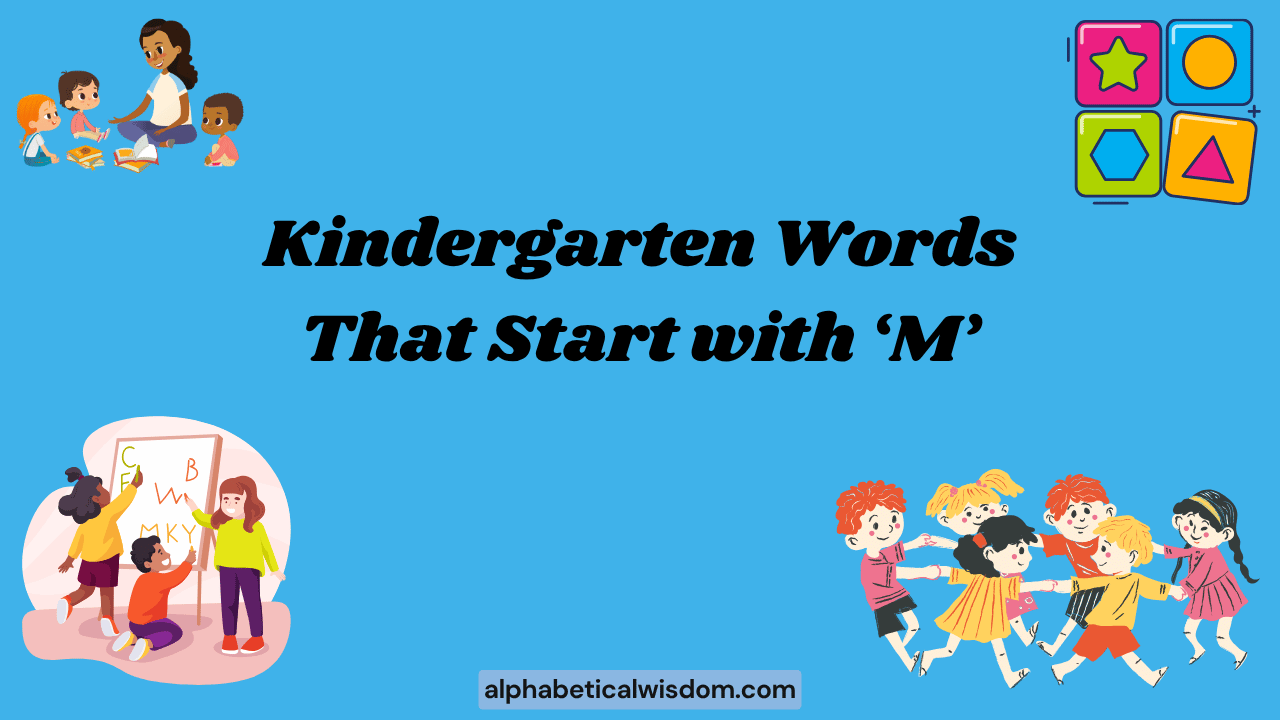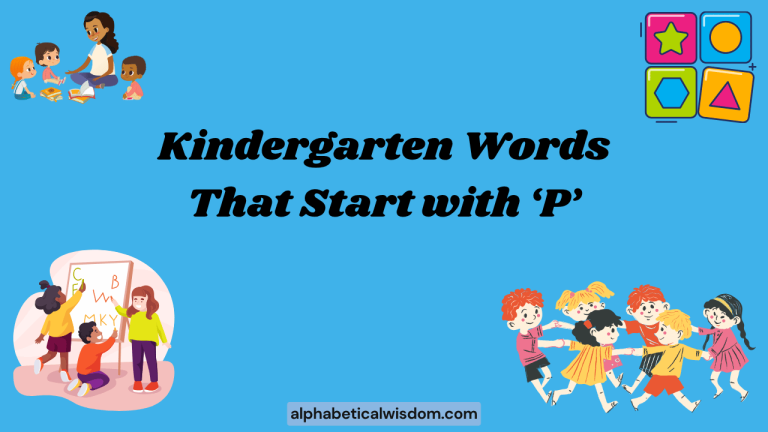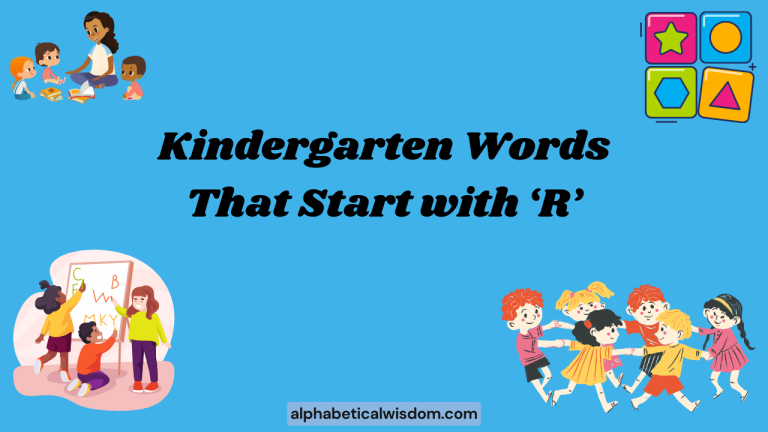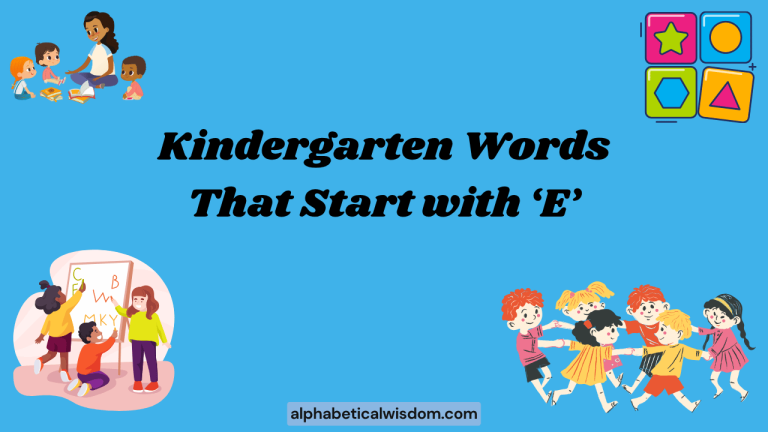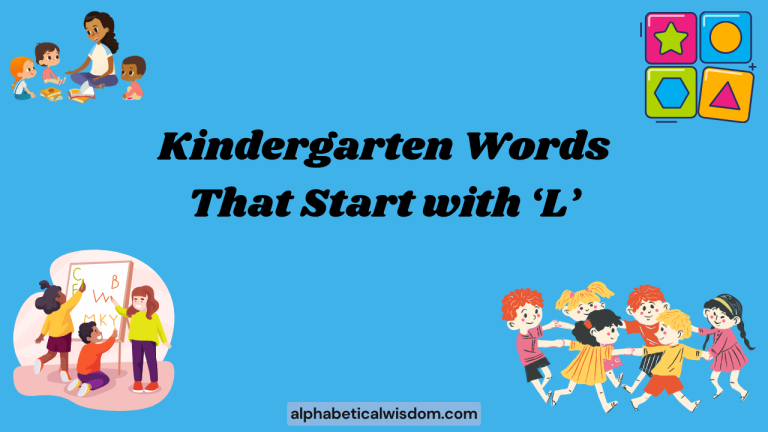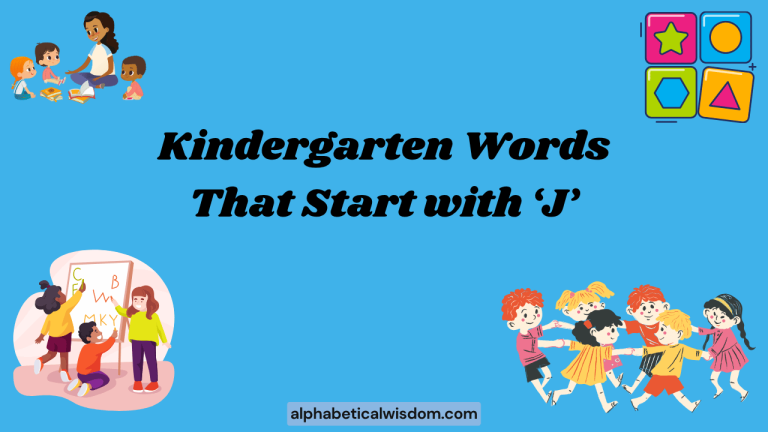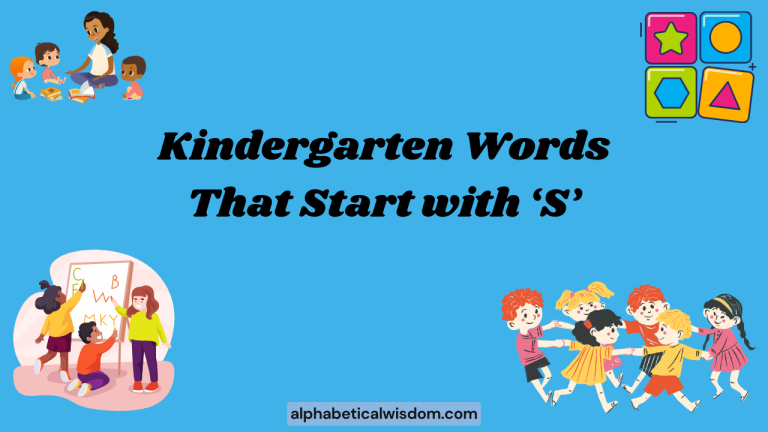Kindergarten Words That Start With M: A Comprehensive Guide
Understanding words that begin with the letter ‘M’ is a crucial step in a child’s literacy journey. This article provides a comprehensive guide to ‘M’ words suitable for kindergarteners, enhancing their vocabulary and reading skills.
It covers definitions, examples, usage, and practice exercises, making it an invaluable resource for parents, teachers, and young learners. This guide will help children build a solid foundation in phonics and early reading comprehension.
Table of Contents
- Introduction
- Definition of Kindergarten Words Starting with M
- Structural Breakdown of ‘M’ Words
- Types and Categories of ‘M’ Words
- Examples of Kindergarten ‘M’ Words
- Usage Rules for ‘M’ Words
- Common Mistakes with ‘M’ Words
- Practice Exercises
- Advanced Topics
- FAQ
- Conclusion
Introduction
Learning new words is an exciting adventure for kindergarteners, and mastering words that begin with the letter ‘M’ is a significant milestone. This article aims to provide a structured and engaging approach to learning these words.
By understanding the definitions, usage, and various examples, children can expand their vocabulary and improve their reading and writing skills. This comprehensive guide is designed to be a valuable resource for parents, teachers, and anyone involved in early childhood education.
Definition of Kindergarten Words Starting with M
Kindergarten words that start with ‘M’ are simple, age-appropriate terms that introduce young learners to the sound and meaning of the letter ‘M’. These words are typically nouns, verbs, or adjectives commonly encountered in a child’s everyday life.
The primary function of these words is to build a foundational vocabulary, improve phonemic awareness, and enhance early reading comprehension. They are used in various contexts, from storytelling and classroom activities to everyday conversations.
Structural Breakdown of ‘M’ Words
The letter ‘M’ is a consonant that typically represents the /m/ sound. In the English language, ‘M’ words usually follow a simple structure, often starting with ‘M’ followed by a vowel and other consonants.
Understanding this structure helps children decode and pronounce new words more easily. For example, the word “mat” follows the consonant-vowel-consonant (CVC) pattern, which is common in early reading materials.
The ‘M’ sound is a bilabial nasal, meaning it is produced by bringing both lips together and allowing air to escape through the nose. This is an important phonetic detail to help children understand how to pronounce the letter correctly. Many ‘M’ words are monosyllabic, making them easier for young learners to grasp. The combination of the ‘M’ sound with different vowels and consonants creates a variety of words that can be introduced gradually to kindergarteners.
Types and Categories of ‘M’ Words
‘M’ words can be categorized based on their grammatical function and the concepts they represent. Here are some common categories:
Animal Words
These words refer to animals whose names start with ‘M’. Examples include mouse, monkey, moose, and more.
Food Words
These are words for food items that begin with ‘M’, such as milk, melon, muffin, and meat.
Object Words
These words represent tangible objects like mat, mug, mirror, and map.
Action Words
These are verbs that start with ‘M’, describing actions such as move, make, mix, and mend.
Descriptive Words
These are adjectives that begin with ‘M’, used to describe qualities or characteristics, like mad, many, and merry.
Examples of Kindergarten ‘M’ Words
Providing numerous examples is crucial for solidifying a child’s understanding of ‘M’ words. The following tables categorize ‘M’ words to help learners grasp different contexts and usages.
Animal Words
This table provides examples of animals whose names begin with the letter ‘M’. Each word is accompanied by a simple sentence to illustrate its use.
| Word | Example Sentence |
|---|---|
| Mouse | The mouse ran across the floor. |
| Monkey | The monkey swung from the tree. |
| Moose | A big moose was in the forest. |
| Marmot | The marmot lives in a burrow. |
| Mallard | The mallard swam in the pond. |
| Mantis | The mantis sat on the plant. |
| Maggot | The maggot was on the leaf. |
| Mackerel | The mackerel swam in the sea. |
| Macaw | The colorful macaw flew in the sky. |
| Moth | A moth flew around the light. |
| Mule | The mule carried the heavy load. |
| Mink | The mink swam in the river. |
| Minnow | The little minnow darted in the stream. |
| Marten | The marten climbed the tree. |
| Meerkat | The meerkat stood tall on the sand. |
| Mole | The mole dug a tunnel underground. |
| Mosquito | The mosquito buzzed near my ear. |
| Mudskipper | The mudskipper hopped on the mudflat. |
| Muskrat | The muskrat built a dam in the pond. |
| Myna | The myna bird sang a cheerful song. |
Food Words
This table showcases food items that start with the letter ‘M’, each accompanied by a sentence to illustrate its usage in a sentence.
| Word | Example Sentence |
|---|---|
| Milk | I drink milk with my breakfast. |
| Melon | We ate sweet melon at the picnic. |
| Muffin | She baked a chocolate muffin. |
| Meat | We had meat for dinner last night. |
| Mango | The mango was very juicy and sweet. |
| Macaroni | My favorite dish is macaroni and cheese. |
| Marshmallow | We roasted marshmallows over the campfire. |
| Maple Syrup | I like maple syrup on my pancakes. |
| Meringue | The meringue was light and airy. |
| Mint | The tea had a refreshing mint flavor. |
| Mustard | I put mustard on my hot dog. |
| Muesli | She eats muesli for breakfast every morning. |
| Mozzarella | The pizza was topped with mozzarella cheese. |
| Mushroom | We added mushrooms to the pasta sauce. |
| Marmalade | I spread marmalade on my toast. |
| Marzipan | The cake was decorated with marzipan. |
| Matzo | We ate matzo during Passover. |
| Medlar | The medlar fruit has a unique taste. |
| Mulberry | We picked mulberries from the tree. |
| Mochi | She loves to eat mochi for dessert. |
Object Words
This table provides examples of objects commonly found in a child’s environment that start with the letter ‘M’, along with example sentences.
| Word | Example Sentence |
|---|---|
| Mat | I wipe my feet on the mat. |
| Mug | I drink hot chocolate from my mug. |
| Mirror | I look at myself in the mirror. |
| Map | We used a map to find our way. |
| Mask | He wore a mask for Halloween. |
| Money | I saved my money to buy a toy. |
| Moon | The moon shines brightly at night. |
| Motorcycle | My dad rides a motorcycle on weekends. |
| Magnet | The magnet stuck to the fridge. |
| Microphone | She sang into the microphone at the concert. |
| Mittens | I wear mittens to keep my hands warm. |
| Monument | We visited the historical monument. |
| Mosaic | The artist created a beautiful mosaic. |
| Mountain | We hiked up the tall mountain. |
| Mouse (computer) | I use a mouse to control the computer. |
| Magazine | She read a magazine about animals. |
| Magnifying Glass | He used a magnifying glass to see the tiny details. |
| Marbles | The children played with colorful marbles. |
| Measuring Cup | She poured the flour into the measuring cup. |
| Medal | He won a medal for his athletic achievement. |
Action Words
This table includes verbs starting with the letter ‘M’ that describe actions children might perform or observe, accompanied by example sentences.
| Word | Example Sentence |
|---|---|
| Move | Please move your chair closer. |
| Make | I like to make crafts with paper. |
| Mix | We mix the ingredients for the cake. |
| Mend | She can mend a torn shirt. |
| March | The soldiers march in a parade. |
| Measure | We measure the length of the table. |
| Melt | The ice cream will melt in the sun. |
| Memorize | Try to memorize the poem. |
| Mention | Don’t mention his surprise party. |
| Message | I will message you later. |
| Migrate | Birds migrate to warmer climates. |
| Mimic | He likes to mimic his friends. |
| Mind | Do you mind if I sit here? |
| Miss | I miss my grandma. |
| Moan | He moaned because his stomach hurt. |
| Multiply | We learned to multiply in math class. |
| Mumble | He tends to mumble when he’s nervous. |
| Munch | She likes to munch on carrots. |
| Murmur | The crowd began to murmur. |
| Maintain | We should maintain a clean environment. |
Descriptive Words
This table presents adjectives that start with the letter ‘M’, which can be used to describe various qualities or characteristics, along with example sentences.
| Word | Example Sentence |
|---|---|
| Mad | He was mad because he lost his toy. |
| Many | There are many stars in the sky. |
| Merry | We had a merry Christmas celebration. |
| Magical | The fairy tale was magical. |
| Magnificent | The view from the mountaintop was magnificent. |
| Main | The main reason for the trip was relaxation. |
| Majestic | The eagle is a majestic bird. |
| Massive | The elephant is a massive animal. |
| Mature | She is a mature and responsible young woman. |
| Mean | It’s not nice to be mean to others. |
| Measly | He received a measly amount of candy. |
| Meaty | The stew was full of meaty chunks. |
| Medical | She needed medical attention after the accident. |
| Mediocre | The performance was mediocre at best. |
| Melodic | The song had a melodic tune. |
| Memorable | The vacation was very memorable. |
| Mental | Taking care of your mental health is important. |
| Merciful | The judge was merciful towards the defendant. |
| Messy | His room was very messy and disorganized. |
| Mild | The weather was mild and pleasant. |
Usage Rules for ‘M’ Words
Using ‘M’ words correctly involves understanding their grammatical function and context. Nouns like “mouse” and “milk” require articles (a, an, the) or possessive pronouns (my, your, his) depending on the context.
Verbs like “move” and “make” need to agree with the subject in number and tense. Adjectives like “mad” and “many” should be placed before the nouns they modify.
Rule 1: Nouns usually require articles. For example, “I saw a mouse” or “The milk is cold.”
Rule 2: Verbs must agree with the subject. For example, “I move” (present tense) and “He moves” (present tense, third person singular).
Rule 3: Adjectives should precede the noun they describe. For instance, “Many stars” or “Mad scientist.”
Common Mistakes with ‘M’ Words
One common mistake is confusing words with similar sounds but different meanings, such as “mail” and “male.” Another error is misusing articles before nouns. For example, saying “I saw mouse” instead of “I saw a mouse.” Additionally, children might struggle with the correct tense of verbs, saying “I make yesterday” instead of “I made yesterday.”
| Incorrect | Correct | Explanation |
|---|---|---|
| I saw mouse. | I saw a mouse. | The noun “mouse” requires an article. |
| I make yesterday. | I made yesterday. | The verb “make” needs to be in the correct tense. |
| Mail is for mans. | Mail is for men. | Confusing “mans” (incorrect plural) with “men” (correct plural). |
Practice Exercises
These exercises are designed to help reinforce the understanding of ‘M’ words. They include fill-in-the-blanks, sentence completion, and word matching activities.
Exercise 1: Fill in the Blanks
Fill in the blanks with the correct ‘M’ word from the word bank: (milk, monkey, mat, move, mad)
| Question | Answer |
|---|---|
| The _______ is soft and warm. | mat |
| The _______ swung from the tree. | monkey |
| I drink _______ with my cereal. | milk |
| Please _______ your chair closer. | move |
| He was _______ because he lost his toy. | mad |
| The cat sat on the _____. | mat |
| The baby drinks _____. | milk |
| The _____ ate a banana. | monkey |
| I _____ to the music. | move |
| She was _____ when she dropped her ice cream. | mad |
Exercise 2: Sentence Completion
Complete the following sentences using an appropriate ‘M’ word.
| Question | Answer |
|---|---|
| I looked at my reflection in the _____. | mirror |
| We used a _____ to find our location. | map |
| She ate a delicious _____. | muffin |
| The _____ shines at night. | moon |
| My mom gave me some _____. | money |
| The _____ ran across the field. | mouse |
| He wore a _____ to the party. | mask |
| I like _____ on my pancakes. | maple syrup |
| She likes to eat _____. | mango |
| I use a _____ to stir my coffee. | metal spoon |
Exercise 3: Word Matching
Match the ‘M’ word with its correct definition.
| Word | Definition | Answer |
|---|---|---|
| Mouse | A sweet baked good. | Mouse – A small rodent. |
| Muffin | A liquid white beverage. | Muffin – A sweet baked good. |
| Milk | A piece of cloth for the floor. | Milk – A liquid white beverage. |
| Mat | A small rodent. | Mat – A piece of cloth for the floor. |
| Mad | Feeling angry. | Mad – Feeling angry. |
| Moon | A flat representation of the Earth. | Moon – The Earth’s natural satellite. |
| Map | The Earth’s natural satellite. | Map – A flat representation of the Earth. |
| Mend | To repair something. | Mend – To repair something. |
| Mix | To combine ingredients. | Mix – To combine ingredients. |
| Magnet | An object that attracts metal. | Magnet – An object that attracts metal. |
Advanced Topics
For advanced learners, exploring compound words that start with ‘M’, such as “mailman” and “moonlight,” can be beneficial. Additionally, investigating the etymology of ‘M’ words and their origins in different languages can provide a deeper understanding of language evolution.
Exploring idiomatic expressions that use ‘M’ words, such as “make a mountain out of a molehill,” can also enhance language proficiency.
Furthermore, understanding the use of ‘M’ in more complex vocabulary, such as “metamorphosis” or “magnanimous,” can expand a child’s linguistic capabilities. Encouraging children to create their own stories using a variety of ‘M’ words can foster creativity and critical thinking.
FAQ
Here are some frequently asked questions about kindergarten words that start with ‘M’:
- What are some simple ‘M’ words for kindergarteners?
Simple ‘M’ words include mat, milk, mug, map, mouse, moon, and more. These words are easy to pronounce and commonly encountered in everyday life.
- How can I help my child learn ‘M’ words?
Use flashcards, read books with ‘M’ words, play word games, and encourage your child to use these words in sentences. Repetition and context are key to learning.
- What are some common mistakes children make with ‘M’ words?
Common mistakes include mispronouncing the ‘M’ sound, confusing ‘M’ words with similar-sounding words, and misusing articles before ‘M’ nouns.
- Why is it important for kindergarteners to learn ‘M’ words?
Learning ‘M’ words helps build a foundational vocabulary, improves phonemic awareness, and enhances early reading comprehension, setting the stage for future literacy success.
- Are there any fun activities to learn ‘M’ words?
Yes, you can play ‘I Spy’ with ‘M’ objects, create ‘M’ word collages, or act out actions that start with ‘M’. These activities make learning engaging and memorable.
- How can I make learning ‘M’ words interactive?
Use tactile materials like playdough to form the letter ‘M’, create ‘M’ word puzzles, or go on a scavenger hunt to find objects that start with ‘M’.
- What should I do if my child struggles with ‘M’ words?
Be patient and provide plenty of positive reinforcement. Break down the words into smaller sounds, use visual aids, and focus on making learning fun and stress-free.
- How many ‘M’ words should a kindergartener know?
There is no specific number, but a good goal is to introduce at least 10-15 common ‘M’ words. Focus on mastery rather than quantity, ensuring the child understands the meaning and usage of each word.
- What are some advanced ‘M’ words for kindergarteners who are ahead?
Advanced words could include ‘magnificent’, ‘melody’, ‘mystery’, ‘meadow’, and ‘marvelous’. These words can help to further expand their vocabulary.
- How can I assess my child’s understanding of ‘M’ words?
You can assess their understanding through simple quizzes, asking them to define ‘M’ words, or having them use the words in sentences. Observation during reading and writing activities can also provide valuable insights.
Conclusion
Mastering kindergarten words that start with ‘M’ is a vital step in a child’s early literacy development. This comprehensive guide has provided definitions, examples, usage rules, and practice exercises to facilitate effective learning.
By understanding the structure and context of these words, children can build a strong foundation in phonics and reading comprehension. Continuous practice and engaging activities will help solidify their knowledge and foster a lifelong love of learning.
Remember to be patient and supportive, making the learning process enjoyable for your child. Consistent reinforcement and creative activities will enhance their vocabulary and confidence in using ‘M’ words.
With dedication and the right resources, your child can confidently navigate the world of ‘M’ words and beyond.
